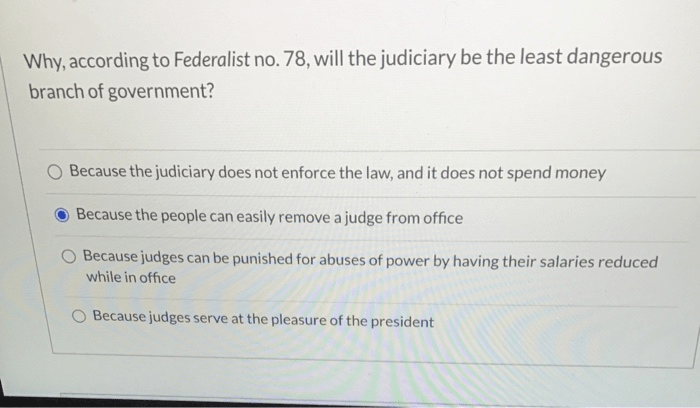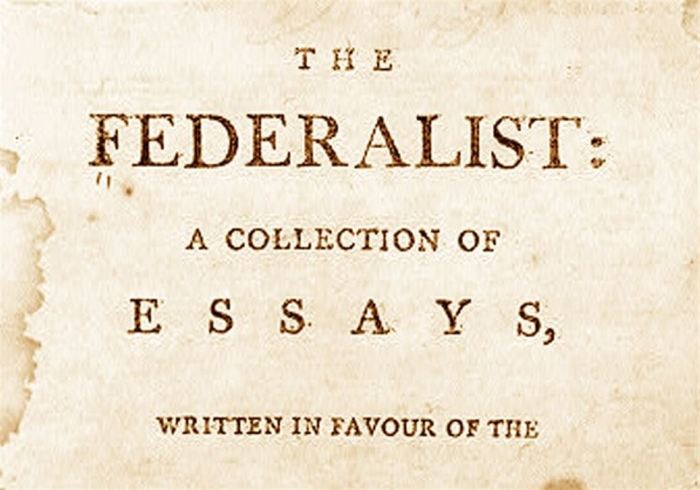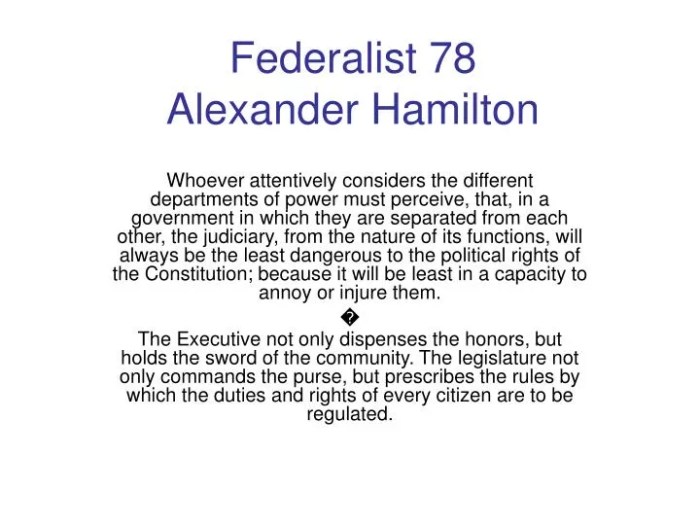Federalist 78 questions and answers – Federalist 78: Questions and Answers on the Independent Judiciary delves into the significance of an impartial judiciary in a democratic society. It examines the arguments presented by Alexander Hamilton in support of judicial independence, explores the role of the judiciary within the system of checks and balances, and analyzes the impact of judicial review on federalism.
This comprehensive guide provides a thorough understanding of the appointment and removal of judges, the structure and organization of the federal judiciary, and its impact on American society.
Federalist 78: The Importance of an Independent Judiciary
Federalist 78, written by Alexander Hamilton, emphasizes the crucial role of an independent judiciary in a democratic society. It argues that an impartial judiciary is essential for upholding the rule of law, protecting individual rights, and ensuring the balance of power among the branches of government.
Role of an Independent Judiciary
An independent judiciary operates free from political interference and external pressures, allowing judges to make impartial decisions based solely on the law. This independence ensures that:
- Enforcement of the Rule of Law:Judges interpret and apply the law fairly, ensuring that the government and individuals adhere to legal principles.
- Protection of Individual Rights:The judiciary serves as a safeguard against government overreach, protecting fundamental freedoms and rights enshrined in the Constitution.
- Balance of Power:An independent judiciary acts as a check on the executive and legislative branches, preventing any one branch from accumulating excessive power.
Checks and Balances and the Judiciary

The US Constitution establishes a system of checks and balances to ensure that no one branch of government becomes too powerful. The judiciary is an essential part of this system, as it has the power to interpret the laws and declare them unconstitutional.
How the Judiciary Fits into the System of Checks and Balances, Federalist 78 questions and answers
The judiciary is the branch of government that interprets the laws and applies them to specific cases. It also has the power to declare laws unconstitutional, which means that they cannot be enforced. This power gives the judiciary a great deal of influence over the other branches of government.
Ways in which the Judiciary Can Check the Other Branches of Government
- Judicial Review:The judiciary can declare laws passed by the legislative branch unconstitutional. This power ensures that the laws are consistent with the Constitution and protects the rights of citizens.
- Interpretation of Laws:The judiciary interprets the laws passed by the legislative branch. This power gives the judiciary a great deal of influence over how the laws are implemented and enforced.
- Enforcement of Laws:The judiciary can enforce the laws passed by the legislative branch and the executive branch. This power ensures that the laws are followed and that the government is held accountable for its actions.
Judicial Review and Federalism

Judicial review, a fundamental principle in the US legal system, empowers the judiciary to interpret and rule on the constitutionality of laws and government actions. This authority plays a critical role in maintaining the balance of power among the branches of government and upholding the supremacy of the Constitution.
The Supreme Court, as the highest court in the land, holds the primary responsibility for interpreting the Constitution. Its decisions set precedents that guide lower courts and shape the legal landscape. Through judicial review, the Supreme Court can declare laws or executive actions unconstitutional, thereby invalidating them.
Impact on Federalism
Judicial review has a profound impact on federalism, the division of power between the federal government and the states. By interpreting the Constitution, the Supreme Court can determine the limits of federal authority and protect states’ rights. This role ensures that neither the federal government nor the states overstep their constitutional boundaries.
For example, in McCulloch v. Maryland(1819), the Supreme Court ruled that the federal government had the implied power to create a national bank, even though the Constitution did not explicitly grant such power. This decision expanded the scope of federal authority while preserving the principle of limited government.
The Appointment and Removal of Judges: Federalist 78 Questions And Answers

The process of appointing and removing federal judges is crucial to ensuring the independence and impartiality of the judiciary, which is a cornerstone of the American system of government. This process involves a delicate balance of power between the President and the Senate, and is designed to ensure that only qualified and impartial individuals are appointed to the federal bench.
Presidential Nomination
The President of the United States has the power to nominate individuals to fill vacancies on the federal bench, including the Supreme Court. When a vacancy occurs, the President will typically consult with advisors, legal experts, and interest groups to identify potential candidates.
The President may also consider recommendations from members of Congress or other individuals.
Senate Confirmation
Once the President has nominated an individual to a federal judgeship, the nomination must be confirmed by the Senate. The Senate Judiciary Committee holds hearings to review the nominee’s qualifications, experience, and judicial philosophy. The committee then votes on whether to recommend the nomination to the full Senate for a vote.
If the committee votes favorably, the full Senate will vote on the nomination. A simple majority vote is required for confirmation.
Mechanisms for Removal
Federal judges are appointed for life, but they can be removed from office through a process known as impeachment. Impeachment is a political process that begins in the House of Representatives, which has the sole power to impeach a federal judge.
If the House votes to impeach a judge, the judge is then tried by the Senate. A two-thirds majority vote in the Senate is required to remove a judge from office.
The Federal Judiciary in Practice

The federal judiciary is the system of courts established by the United States Constitution to interpret and apply federal law. It is composed of the Supreme Court, the federal appellate courts, and the federal district courts.The federal judiciary plays a vital role in the American system of government.
It is the final arbiter of the meaning of the Constitution and federal law. It also has the power to review the actions of the other branches of government to ensure that they are consistent with the Constitution.
Structure and Organization of the Federal Judiciary
The federal judiciary is a hierarchical system, with the Supreme Court at the apex. The Supreme Court is composed of nine justices who are appointed by the President and confirmed by the Senate. The Supreme Court has the power to review decisions of the lower federal courts and state courts.Below
the Supreme Court are the federal appellate courts. There are 13 federal appellate courts, each of which has jurisdiction over a specific geographic region. The federal appellate courts review decisions of the federal district courts.The federal district courts are the trial courts of the federal judiciary.
There are 94 federal district courts, each of which has jurisdiction over a specific geographic area. The federal district courts hear a wide variety of cases, including civil cases, criminal cases, and bankruptcy cases.
Types of Cases Heard in Federal Courts
The federal courts have jurisdiction over a wide variety of cases, including:* Cases involving the Constitution
- Cases involving federal law
- Cases involving diversity of citizenship
- Cases involving admiralty and maritime law
- Cases involving bankruptcy
Impact of the Federal Judiciary on American Society
The federal judiciary has a profound impact on American society. It is the guardian of the Constitution and the protector of individual rights. The federal judiciary also plays a vital role in the functioning of the American government. It is the final arbiter of disputes between the states and the federal government.
It also has the power to review the actions of the other branches of government to ensure that they are consistent with the Constitution.
Question & Answer Hub
What is the purpose of Federalist 78?
Federalist 78 argues for the importance of an independent judiciary in a democratic society.
How does the judiciary fit into the system of checks and balances?
The judiciary can check the other branches of government through judicial review, which allows it to declare laws and actions unconstitutional.
What is the role of the Supreme Court in interpreting the Constitution?
The Supreme Court has the final say on the interpretation of the Constitution, and its decisions are binding on all other courts.